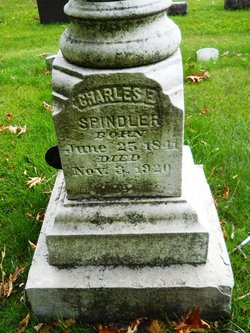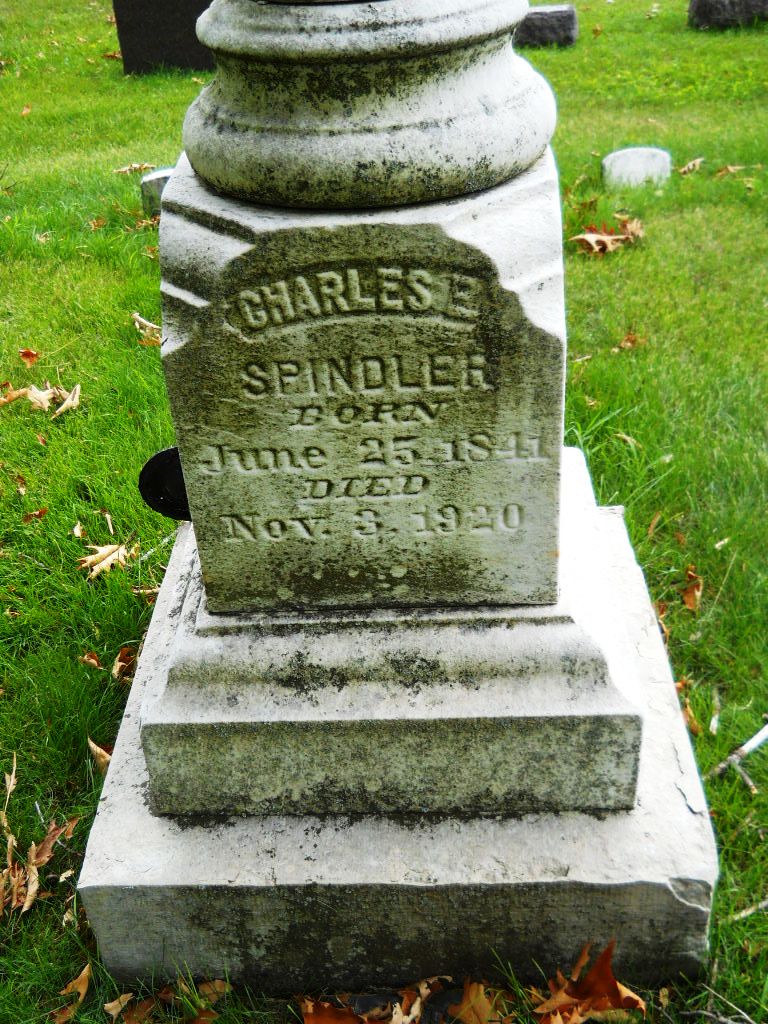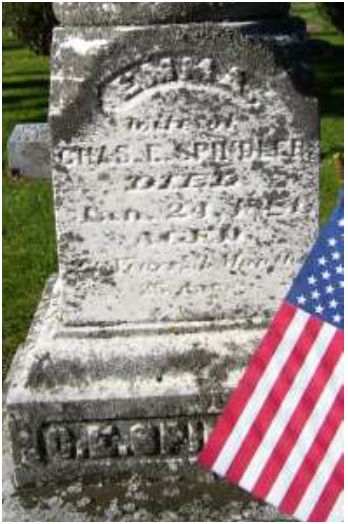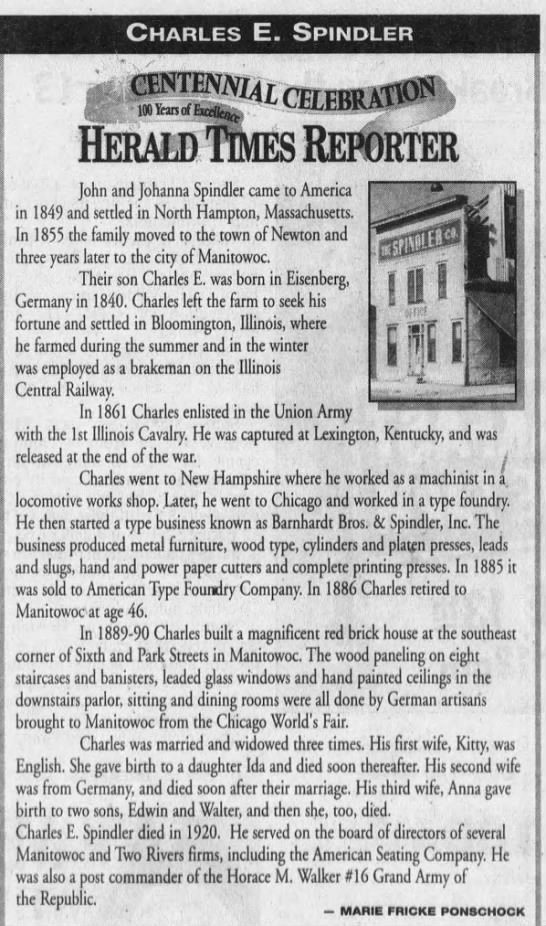Enlisted: July 3, 1861 as a Private from Bloomington, IL.
POW: September 20, 1861 at Lexington, MO (Paroled)
Discharged: October 6, 1861
Manitowoc Herald News, Thursday, November 4, 1920 pp.1,8:
"C.E. SPINDLER DIES SUDDENLY; HEART FAILURE Had Attack Tuesday But Apparently He Had Recovered Charles E. Spindler, one of the best known residents of the city, prominently identified with business interest here for forty years, a member of the Barnhardt Bros. & Spindler Co. of Chicago and other large interests, and a civil war veteran, died at his home on Park street at 10:30 o'clock last evening. Mr. Spindler's death was due to heart failure. The end came almost without warning and was calm and peacful, fulfilling a wish that Mr. Spindler had often expressed that when his time to leave came he might not linger and suffer. Mr. Spindler suffered an attack of illness at the Elks club Tuesday night, but had apparently recovered and yesterday was up and about the house though he was restless. SON WITH HIM AT END During the evening he was visited by his two sons Edwin and Walter, the latter having left the home but a short time before the fatal attack came. Mr. and Mrs. Edwin Spindler, who had remained and were about to leave, were with Mr. Spindler when the end came. Mr. Spindler had walked from the parlors into his own room and it is believed had a premonition that the end was at hand. As he entered his room he turned to his son and said "Good-Bye," and then was seen to waver in his step, gasp and fall and before the son could reach his side, had passed away. CAME TO AMERICA IN 1849 Mr. Spindler was born at Eisenberg, Germany, June 25, 1841 and with his parents came to America in 1849 when he was a boy of eight years. The family located at Northampton, Mass., and in 1855 removed to this county where they located on a farm in the town of Newton. Mr. Spindler left the parental roof when quite young and located at Bloomington, Ill. where he engaged in farming during the summer and in the winter was employed as a brakeman on the Illinois Central railway, remaining at Bloomington until the outbreak of the civil war. ACTIVE AS A MAN OF 80 The death of Mr. Spindler comes as a shock to the community in which he was so widely known and to those who knew him most intimately there is a sense of personal loss. Although nearly 80 years of age Mr. Spindler had the activity of a man of thirty years younger and was a daily visitor at the Elks club and about town. He possessed a keen mind and was interested in events of the day in his home city and outside. A man of wide business experience and large affairs, his success was that of the self-made man and a tribute to energy of his early days and foresight in business. On July 3, 1861, Mr. Spindler enlisted for a three-year term in the first Illinois cavalry and with his command was assigned to the division of Gen. Mulligan which was sent to reinforce troops at Lexington where a large amount of money had been consigned, and it was here that Mr. Spindler was taken prisoner by the enemy after his command had been fighting for fifty-two hours without cessation, the rebels taking $900,000. When the battle opened Mr. Spindler was on picket duty two miles from the city of Lexington and warned his command of the attack but was told that the alarm was a false one. Returning to his comrades he found that they had fled and he was forced to return to the city, to rejoin his command, several of his comrades being shot down at his side. Mr. Spindler was
with Gen. Mulligan's troops when the surrender took place. Later the prisoners were released on parole and went to St. Louis where they were discharged from the service. Following his discharge Mr. Spindler located at Kean, N.H., where he entered the shops of a big locomotive works as a machinist and it was while here that he became a member of the first union organization, at that time known as the Locomotive Repair Workers Union, and he carried a card in the organization for many years. GOES INTO BUSINESS Later Mr. Spindler decided to return west and located at Chicago where he entered the employ of the old Toepfer Type Foundry Co. in which, a few years later, he became interested as owner with the Barnhardt interests, the name being changed to Barnhardt Bros. & Spindler, and under the new owners developing into one of the largest and one of the most important concerns in that line of industry in the United States. Failing health forced Mr. Spindler in the early 80s to retire from active management of the company at Chicago and he returned to this city where he has since resided. Upon his return here he continued to devote himself to the interests of the company by manufacture of special machinery for the company at the Richards Iron Works here. SAVED PLANT IN 1871 FIRE
During his active connection with the company at Chicago, Mr. Spindler was superintendent and general manager up to the time that he removed here. During the great Chicago fire of 1871 it was principally through Mr. Spindler's efforts that the large plant of the company was saved from destruction. When the company was reorganized in 1911 and took over a number of other concerns in the same line of business, Mr. Spindler retained his interests and was a director of the company at the time of his death. The concern is capitalized at $3,000,000. In addition to his interest in the Barnhardt Bros. & Spindler Co. Mr. Spindler was identified
with a number of other concerns including many local enterprises. He was a stockholder in the American Type Foundry Co., of Chicago, the Hamilton Manufacturing and Eggers Veneer Co. of Two Rivers, the old Manitowoc Pea Packing Co., the County Abstract Co., the C. Spindler Co. of this city and was one of the promoters of the Co-operative Orchard Co. of Sturgeon Bay. LED A RETIRED LIFE For the past thirty-five years Mr. Spindler had retired from active business and had lived a quiet life, although he had never permitted himself to surrender his interest in the concerns with which he was identified and had been in close touch at all times with his business interest. His was the ideal life. He enjoyed the fruits of his efforts in early life and unhampered by any restrictions was free to follow his own bent, and it can be said realized a full measure of enjoyment up to the very day of his death. Mr. Spindler some years ago erected a palatial home at Sixth and Park streets but after the death of his wife who did not survive its completion, he deeded the home to his son Edwin and proceeded with erection of a bungalow on Park street which was his home at the time of his death. LEAVES THREE CHILDREN Mr. Spindler is survived by three children, all resident of this city. They are Edwin C. head of the Spindler Co., Walter E., president of the Aluminum Specialty Co. of this city and Chilton and Mrs. J.G. Johnson. Two sisters, Mrs. Bertha Arnold, this city and Mrs. Glenn Olson of Seattle and six grand children also survive. He was a member of Manitowoc Lodge of Elks in which he had evidenced a keen interest since its organization, and was identified with Walker Post of the Grand Army of the Republic. Although he had always taken an interest in public affairs, Mr. Spindler had never permitted his name to be used for public office, preferring the quiet of his home and club to the activities of public life. The funeral of Mr. Spindler will be home on Park street at two o'clock, under auspices of the Elks."
Enlisted: July 3, 1861 as a Private from Bloomington, IL.
POW: September 20, 1861 at Lexington, MO (Paroled)
Discharged: October 6, 1861
Manitowoc Herald News, Thursday, November 4, 1920 pp.1,8:
"C.E. SPINDLER DIES SUDDENLY; HEART FAILURE Had Attack Tuesday But Apparently He Had Recovered Charles E. Spindler, one of the best known residents of the city, prominently identified with business interest here for forty years, a member of the Barnhardt Bros. & Spindler Co. of Chicago and other large interests, and a civil war veteran, died at his home on Park street at 10:30 o'clock last evening. Mr. Spindler's death was due to heart failure. The end came almost without warning and was calm and peacful, fulfilling a wish that Mr. Spindler had often expressed that when his time to leave came he might not linger and suffer. Mr. Spindler suffered an attack of illness at the Elks club Tuesday night, but had apparently recovered and yesterday was up and about the house though he was restless. SON WITH HIM AT END During the evening he was visited by his two sons Edwin and Walter, the latter having left the home but a short time before the fatal attack came. Mr. and Mrs. Edwin Spindler, who had remained and were about to leave, were with Mr. Spindler when the end came. Mr. Spindler had walked from the parlors into his own room and it is believed had a premonition that the end was at hand. As he entered his room he turned to his son and said "Good-Bye," and then was seen to waver in his step, gasp and fall and before the son could reach his side, had passed away. CAME TO AMERICA IN 1849 Mr. Spindler was born at Eisenberg, Germany, June 25, 1841 and with his parents came to America in 1849 when he was a boy of eight years. The family located at Northampton, Mass., and in 1855 removed to this county where they located on a farm in the town of Newton. Mr. Spindler left the parental roof when quite young and located at Bloomington, Ill. where he engaged in farming during the summer and in the winter was employed as a brakeman on the Illinois Central railway, remaining at Bloomington until the outbreak of the civil war. ACTIVE AS A MAN OF 80 The death of Mr. Spindler comes as a shock to the community in which he was so widely known and to those who knew him most intimately there is a sense of personal loss. Although nearly 80 years of age Mr. Spindler had the activity of a man of thirty years younger and was a daily visitor at the Elks club and about town. He possessed a keen mind and was interested in events of the day in his home city and outside. A man of wide business experience and large affairs, his success was that of the self-made man and a tribute to energy of his early days and foresight in business. On July 3, 1861, Mr. Spindler enlisted for a three-year term in the first Illinois cavalry and with his command was assigned to the division of Gen. Mulligan which was sent to reinforce troops at Lexington where a large amount of money had been consigned, and it was here that Mr. Spindler was taken prisoner by the enemy after his command had been fighting for fifty-two hours without cessation, the rebels taking $900,000. When the battle opened Mr. Spindler was on picket duty two miles from the city of Lexington and warned his command of the attack but was told that the alarm was a false one. Returning to his comrades he found that they had fled and he was forced to return to the city, to rejoin his command, several of his comrades being shot down at his side. Mr. Spindler was
with Gen. Mulligan's troops when the surrender took place. Later the prisoners were released on parole and went to St. Louis where they were discharged from the service. Following his discharge Mr. Spindler located at Kean, N.H., where he entered the shops of a big locomotive works as a machinist and it was while here that he became a member of the first union organization, at that time known as the Locomotive Repair Workers Union, and he carried a card in the organization for many years. GOES INTO BUSINESS Later Mr. Spindler decided to return west and located at Chicago where he entered the employ of the old Toepfer Type Foundry Co. in which, a few years later, he became interested as owner with the Barnhardt interests, the name being changed to Barnhardt Bros. & Spindler, and under the new owners developing into one of the largest and one of the most important concerns in that line of industry in the United States. Failing health forced Mr. Spindler in the early 80s to retire from active management of the company at Chicago and he returned to this city where he has since resided. Upon his return here he continued to devote himself to the interests of the company by manufacture of special machinery for the company at the Richards Iron Works here. SAVED PLANT IN 1871 FIRE
During his active connection with the company at Chicago, Mr. Spindler was superintendent and general manager up to the time that he removed here. During the great Chicago fire of 1871 it was principally through Mr. Spindler's efforts that the large plant of the company was saved from destruction. When the company was reorganized in 1911 and took over a number of other concerns in the same line of business, Mr. Spindler retained his interests and was a director of the company at the time of his death. The concern is capitalized at $3,000,000. In addition to his interest in the Barnhardt Bros. & Spindler Co. Mr. Spindler was identified
with a number of other concerns including many local enterprises. He was a stockholder in the American Type Foundry Co., of Chicago, the Hamilton Manufacturing and Eggers Veneer Co. of Two Rivers, the old Manitowoc Pea Packing Co., the County Abstract Co., the C. Spindler Co. of this city and was one of the promoters of the Co-operative Orchard Co. of Sturgeon Bay. LED A RETIRED LIFE For the past thirty-five years Mr. Spindler had retired from active business and had lived a quiet life, although he had never permitted himself to surrender his interest in the concerns with which he was identified and had been in close touch at all times with his business interest. His was the ideal life. He enjoyed the fruits of his efforts in early life and unhampered by any restrictions was free to follow his own bent, and it can be said realized a full measure of enjoyment up to the very day of his death. Mr. Spindler some years ago erected a palatial home at Sixth and Park streets but after the death of his wife who did not survive its completion, he deeded the home to his son Edwin and proceeded with erection of a bungalow on Park street which was his home at the time of his death. LEAVES THREE CHILDREN Mr. Spindler is survived by three children, all resident of this city. They are Edwin C. head of the Spindler Co., Walter E., president of the Aluminum Specialty Co. of this city and Chilton and Mrs. J.G. Johnson. Two sisters, Mrs. Bertha Arnold, this city and Mrs. Glenn Olson of Seattle and six grand children also survive. He was a member of Manitowoc Lodge of Elks in which he had evidenced a keen interest since its organization, and was identified with Walker Post of the Grand Army of the Republic. Although he had always taken an interest in public affairs, Mr. Spindler had never permitted his name to be used for public office, preferring the quiet of his home and club to the activities of public life. The funeral of Mr. Spindler will be home on Park street at two o'clock, under auspices of the Elks."
Family Members
Sponsored by Ancestry
Advertisement
Advertisement


















